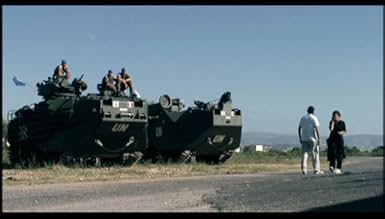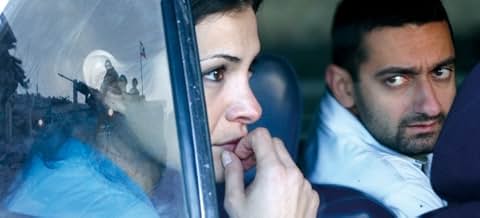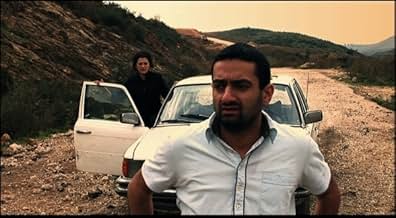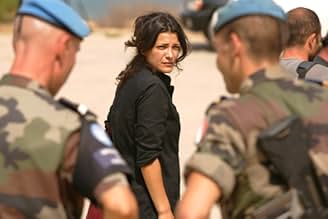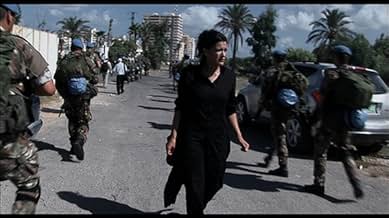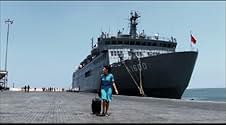IMDb RATING
7.0/10
1.8K
YOUR RATING
In the wake of Israel's 2006 bombardment of Lebanon, a determined woman finds her way into the country convincing a taxi cab driver to take a risky journey around the scarred region in searc... Read allIn the wake of Israel's 2006 bombardment of Lebanon, a determined woman finds her way into the country convincing a taxi cab driver to take a risky journey around the scarred region in search of her sister and her son.In the wake of Israel's 2006 bombardment of Lebanon, a determined woman finds her way into the country convincing a taxi cab driver to take a risky journey around the scarred region in search of her sister and her son.
- Awards
- 8 wins & 4 nominations total
- Director
- Writers
- All cast & crew
- Production, box office & more at IMDbPro
Storyline
Did you know
- TriviaLebanon's 2009 Academy Awards official submission to Foreign-Language Film category.
- Alternate versionsAfter he had received criticisms about the (very soft) sex scene, the director Philippe Aractingi made a version of the movie without this sex scene, for Arab countries.
Featured review
Director Aractingi shot this film in the immediate wake of the systematic 34-day Israeli bombing of Lebanon in summer 2006, which left much of the country devastated, especially the South. He uses his own footage of the bombing itself, which shows whole neighborhoods being decimated, and then shoots among the rubble to tell the story of Zaina (Nada Abou Farhat), a divorced mother who comes from Dubai, where she was living with her architect husband, to find Karim, her six-year-old son, who was trapped by the bombing in Kherbet Salam, a Shia Muslim village in southern Lebanon. Zaina left Karim there with her sister, ironically, to "protect" him from the stress of her divorce. The only taxi driver who'll make the dangerous trip is Tony (George Khabbaz), a Christian who turns out to be from the South himself.
Aractingi got the idea of shooting in war devastation with an improvised plot in 1989 as Lebanon's civil war of that time wound down, but fear prevented him from proceeding. Instead he shot 40 documentaries and one feature that used improvisation (the 2005 Bosta) and also starred Nada Abou Farhat. As he got to work with his cast and crew for Under the Bombs, beginning shooting during the bombing and continuing during the ceasefire, he made the decision not to deal with the war so much as its impact on innocent victims, which Zaina and Karim obviously are.
And many of the people and their sufferings are authentic and real-time. When Tony and Zaina reach Kherbet Salam the building her sister lived in is completely destroyed. A young woman comes up and tells her Maha, her sister, is a martyr now. Zaina and Tony go to witness the disinterring of those who died to be reburied in "martyrs' graves," hoping to find the body of Maha (they do not). Aractingi films the actual funerals--not an easy task.
People say Karim was taken up by foreign journalists and went away with them, and this leads Tony and Zaina further south, just a few kilometers from the Israeli border, where they stop over with Tony's Christian family. It emerges that they were collaborators during the long Israeli occupation of south Lebanon and one brother is among those who fled to live in Israel in the aftermath of that time. The confrontation between Tony and his relatives over this collaboration is the fruit of discussions among villagers which Aractingi and his co-writer, Michel Léviant, condensed into a script. This is one example of how the actual fed into the fictional in the day-to-day shooting.
The emotions are powerful and the backgrounds are horrifying in the film. Nothing quite equals the sense of identification when Zaina looks at a whole street where her sister lived and finds only ruins after the systematic bombing destruction. Less successful at times are the interactions between Zaina and Tony, who flirts, comforts, and acts out a surprisingly graphic sex scene with a room clerk at a hotel they stop at on the way. Khabbaz and Abou Farhat are good, but some cutting might have helped eliminate distracting elements. The car's breaking down just before the couple gets to the monastery where Karim is rumored to be seems a rather obvious suspense device too.
The film is neutral as it can be, perhaps to a fault. One wonders why Hezbollah is barely even mentioned, since it is the other party in the warfare, and was the prime provider of aid to the victims in the bombing's immediate aftermath. Though the collaborating family members refer to being "forced to work for the Devil," meaning Israel, the focus is on the suffering rather than its source. Aractingi's film has flaws, but its boldness in bringing to the screen the 2006 bombing of Lebanon and the civilian suffering it caused can't be faulted.
The San Francisco International Film Festival 2008 provided the West Coast premiere of this film, which was scheduled to open less than two weeks later, on May 12, in Paris. This was nominated for the Grand Jury prize at Sundance and received the EIUC Award at Venice.
Aractingi got the idea of shooting in war devastation with an improvised plot in 1989 as Lebanon's civil war of that time wound down, but fear prevented him from proceeding. Instead he shot 40 documentaries and one feature that used improvisation (the 2005 Bosta) and also starred Nada Abou Farhat. As he got to work with his cast and crew for Under the Bombs, beginning shooting during the bombing and continuing during the ceasefire, he made the decision not to deal with the war so much as its impact on innocent victims, which Zaina and Karim obviously are.
And many of the people and their sufferings are authentic and real-time. When Tony and Zaina reach Kherbet Salam the building her sister lived in is completely destroyed. A young woman comes up and tells her Maha, her sister, is a martyr now. Zaina and Tony go to witness the disinterring of those who died to be reburied in "martyrs' graves," hoping to find the body of Maha (they do not). Aractingi films the actual funerals--not an easy task.
People say Karim was taken up by foreign journalists and went away with them, and this leads Tony and Zaina further south, just a few kilometers from the Israeli border, where they stop over with Tony's Christian family. It emerges that they were collaborators during the long Israeli occupation of south Lebanon and one brother is among those who fled to live in Israel in the aftermath of that time. The confrontation between Tony and his relatives over this collaboration is the fruit of discussions among villagers which Aractingi and his co-writer, Michel Léviant, condensed into a script. This is one example of how the actual fed into the fictional in the day-to-day shooting.
The emotions are powerful and the backgrounds are horrifying in the film. Nothing quite equals the sense of identification when Zaina looks at a whole street where her sister lived and finds only ruins after the systematic bombing destruction. Less successful at times are the interactions between Zaina and Tony, who flirts, comforts, and acts out a surprisingly graphic sex scene with a room clerk at a hotel they stop at on the way. Khabbaz and Abou Farhat are good, but some cutting might have helped eliminate distracting elements. The car's breaking down just before the couple gets to the monastery where Karim is rumored to be seems a rather obvious suspense device too.
The film is neutral as it can be, perhaps to a fault. One wonders why Hezbollah is barely even mentioned, since it is the other party in the warfare, and was the prime provider of aid to the victims in the bombing's immediate aftermath. Though the collaborating family members refer to being "forced to work for the Devil," meaning Israel, the focus is on the suffering rather than its source. Aractingi's film has flaws, but its boldness in bringing to the screen the 2006 bombing of Lebanon and the civilian suffering it caused can't be faulted.
The San Francisco International Film Festival 2008 provided the West Coast premiere of this film, which was scheduled to open less than two weeks later, on May 12, in Paris. This was nominated for the Grand Jury prize at Sundance and received the EIUC Award at Venice.
- Chris Knipp
- May 1, 2008
- Permalink
- How long is Under the Bombs?Powered by Alexa
Details
Box office
- Gross worldwide
- $488,227
- Runtime1 hour 38 minutes
- Color
- Sound mix
- Aspect ratio
- 1.85 : 1
Contribute to this page
Suggest an edit or add missing content



